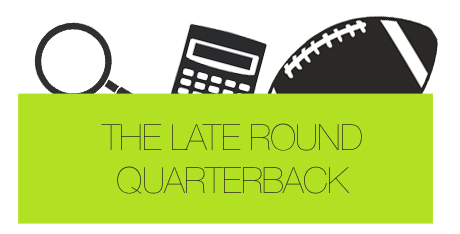Fantasy Football and the Admissibility of Expert Rankings
A few weeks ago I got paid to research the Daubert v. Merrell Dow Pharmaceuticals, U.S. Supreme Court case and Rule 702 of the Federal Rules of Evidence.
My assignment was to learn more about the Daubert standard for governing scientific expert testimony that my beloved State of Florida instituted on July 1st.
Sounds pretty boring doesn’t it?
Well, being the degenerate that I am, I immediately started thinking about how a bill intended to establish admissibility criteria for expert witnesses could be applied to fantasy football.
I wondered if the series of guidelines the Daubert standard uses for admitting expert testimony could help fantasy owners disseminate the difference between sound science and purported expert opinion.
Well, here’s what I found out.
Opening Statement
The Daubert Standard was adopted by federal courts back in 1993 as a means “by which evidence based on innovative or unusual scientific knowledge may be admitted only after it has been established that the evidence is reliable and scientifically valid.”
Rule 702 “Testimony by Expert Witnesses,” states:
A witness who is qualified as an expert by knowledge, skill, experience, training, or education may testify in the form of an opinion or otherwise if:
(a) the expert’s scientific, technical, or other specialized knowledge will help the trier of fact to understand the evidence or to determine a fact in issue;
(b) the testimony is based on sufficient facts or data;
(c) the testimony is the product of reliable principles and methods; and
(d) the expert has reliably applied the principles and methods to the facts of the case. [1]
Wouldn’t it be nice to have a definitive set of guidelines like this that each and every fantasy football writer had to comply with before publishing their rankings and projections?
Sure it would, but let’s be real.
Fantasy football experts generate rankings based on how we should think, not how they think we will feel. Besides, it’s unrealistic to expect an entire community of writers to conform to a standardized method for assigning certainty where none exists.
The way I see it, we owe it to ourselves to apply the guidelines of the Daubert standard and exercise our own scientific judgement before accepting an expert’s testimony as relevant evidence in our fantasy football courtrooms.
Expert Discovery
The next time you need to call a fantasy football expert to the stand, try answering these three qualifying questions to determine if the witness’ rankings and techniques would hold up against a Daubert challenge.
1. Does the expert use techniques that are objective?
Objectivity is priority number one.
You must rely only on experts who offer testimony that is sufficiently tied to the facts of the case. Be sure to investigate the all of the evidence, theories, and data the expert witness used to reach their conclusions. Your goal must be to get your hands on every piece of information that either supports or contradicts the expert’s opinions.
If after conducting your research you suspect an expert’s biases may have caused them extrapolate unjustifiably from an accepted premise to an unfounded conclusion, use the guidelines of the Daubert standard to strike their opinion from the record. [2]
2. Is the witness willing to specify the known error rate or potential error rate for their methodology?
Many of us hold the responsibility of managing our fantasy football team in a higher regard than serving as a federal judge in the US Supreme Court. However, there are plenty of serious players who don’t realize that fantasy football projections fail to predict actual results because they’re based on anecdotes and opinions, not scientifically acceptable data.
The Daubert standard requires that an expert witness be able to demonstrate their use of an appropriate methodology to ensure [their] opinion derives from and constitutes a form of special knowledge.
While you can’t expect every writer to openly divulge their methods of applying “unusual scientific knowledge,” I wouldn’t listen to anyone who claims not to make mistakes.
3. Have the expert’s techniques been subject to peer review?
Developing novel theories to support your own conclusions is junk science. Peer review and publication is paramount.
According to the Daubert standard, experts must produce reliable data and prove that their methods and conclusions are generally accepted within the scientific community.
Luckily for you sites like FantasyRundown.com and ffgator.com do an excellent job of compiling the best rankings and fantasy football analysis from the most reliable experts in the industry.
Trust me when I tell you that these are your best resources for finding peer reviewed literature where the experts have supported their opinions with factual information.
You be the Judge
My goal for presenting you with the Daubert standard guidelines and the questions for challenging expert testimony is to provide you with a method of filtering through hidden assumptions and misrepresentations in fantasy football rankings so that you can make better decisions for yourself.
Please remember that you are the gatekeeper. It’s your responsibility as a fantasy owner to assure that expert testimony truly proceeds from scientific knowledge. You must decide whether a witness’ methods are reliable and are being reliably applied to the facts at hand. Applying the Daubert standard simply gives you a reliable method of examining expert testimony that is often times very unreliable.
Best of luck!
References: [1] “Florida Legislature Adopts Daubert Standard for Expert Testimony” – By: Stephen Mahle [2] “Surviving a Daubert Motion: 18 Tips for Your Expert Witness” – blog.seakexperts.coms